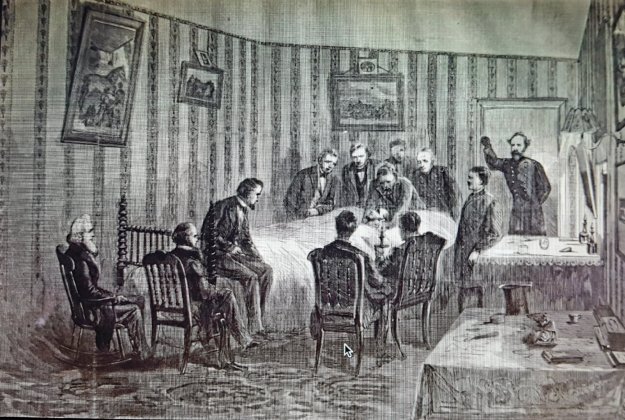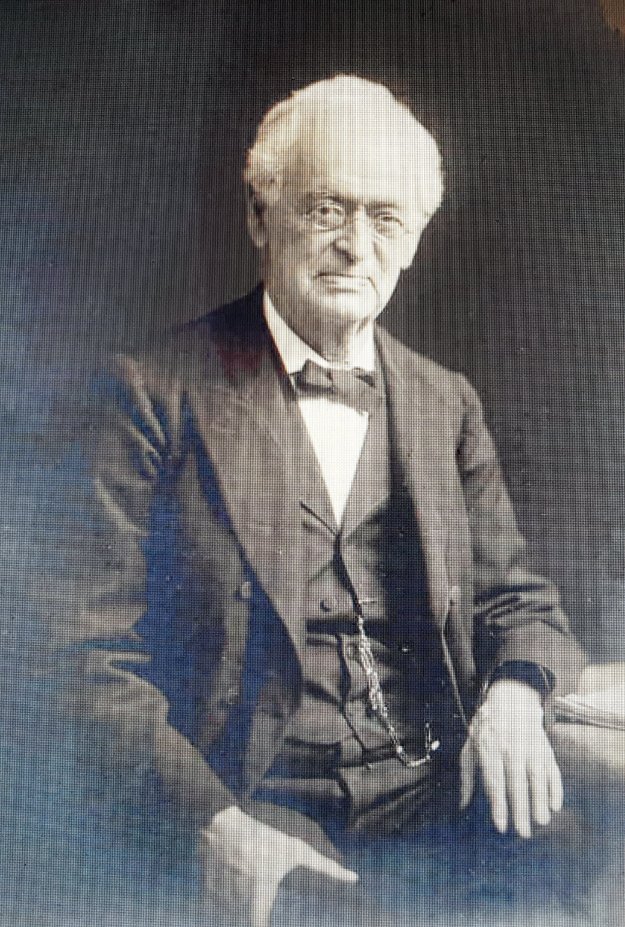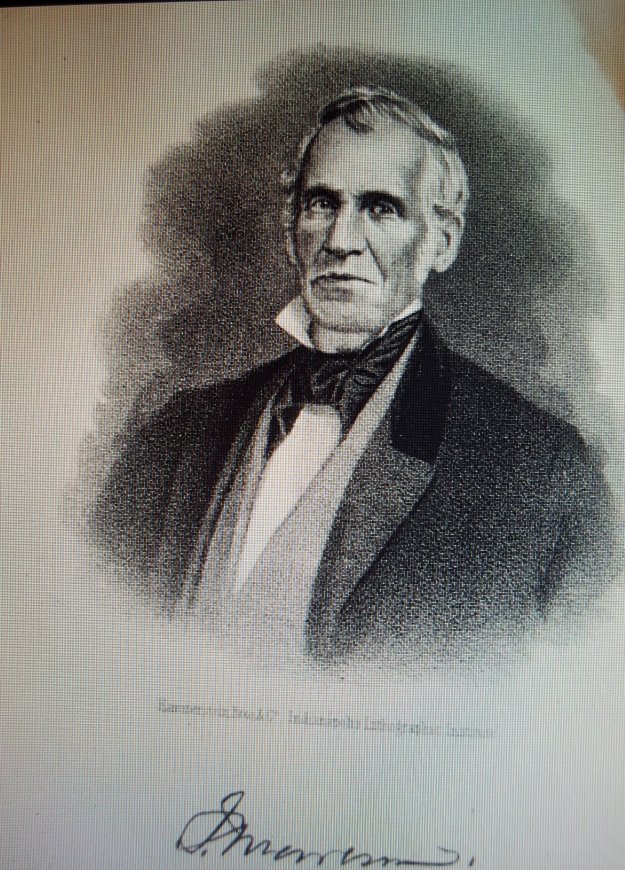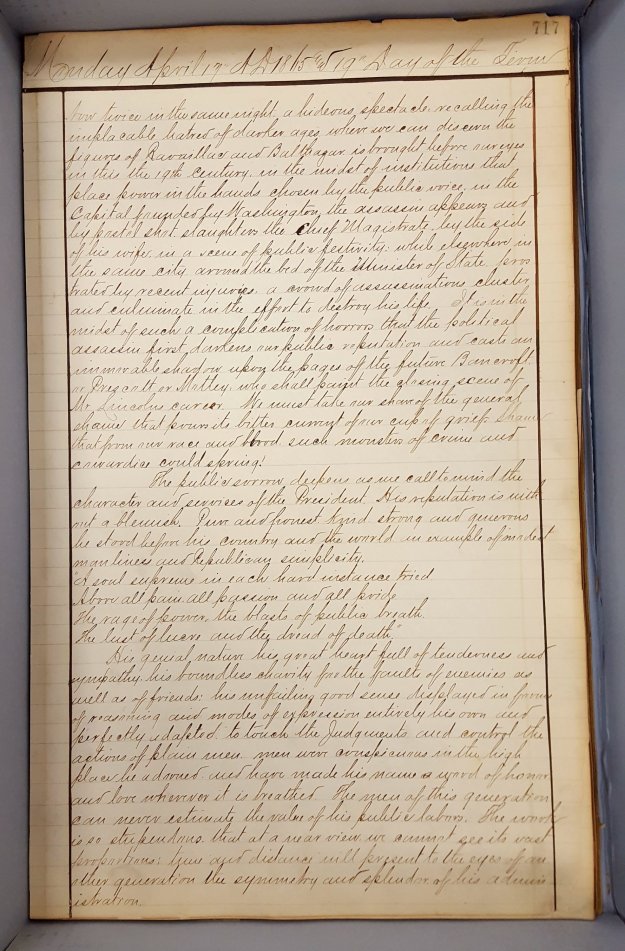
Marion County Circuit Court Book 21

Monday April 17 AD 1865 and 19″ Day of the Term
Monday morning at the hour of Nine oclock on the 17″ day of April 1865, Court met pursuant to adjournment.
Present the Hon Fabius M. Finch Judge
Death of Abraham Lincoln
On motion of Hon. James Morrison. It is ordered by the committee appointed at the meeting of the Indianapolis Bar on the occasion of the death of Abraham Lincoln, be entered on the records of this Court which is done in the words following to wit:
The assassination of Abraham Lincoln, President of the United States on the evening of the 14″ day of April 1865 is an event so shocking and deplorable as to fill the heart of every citizen worthy of his birthright, with the keenest anguish on this dreadful tragedy acted almost in the face of the nation, in circumstance of horror seems wanting. After a long season of gloom, the fruit of a desperate intestine war, the public heart was beating high with hope, as the triumph of our arms, the fall of the rebel capital, and the surrender of the rebel’s military leader, with his army, promised the speedy return of union and peace. The nation was elate with joy. The President not only shared these universal sentiments of delight, but was devoting his thoughts to confirm the public joy by measures that should insure the rapid pacification of the country with as little bloodshed or misery or individual wretchedness as possible. A day of general thanksgiving had been fixed – a day on which the nation was invited to praise God, the universal Father: to praise him in the spirit of worshippers who look on all men as brethren: to praise him without exulting over our enemies, but with prayers for their repentance and return to a true allegiance. At this auspicious moment, when the clouds are flying, and on their retreating folds the cheering colors of the rainbow gather, the hand of the assassin is bared, the people’s leader falls dumb in death and the Republic sinks under all the bitterness of our overwhelming sorrow.
The mode of the President’s death intensifies our anguish. Never before in this country has the pistol or the dagger of the assassin been employed to put out of the way a great public magistrate.
Monday April 17″ AD 1865 and the 19″ Day of the term
How twice in the same night a hideous spectacle, recalling the implacable hatred of darker ages, when we can discover the figures of Revaillac [“a French Catholic zealot who assassinated King Henry IV of France in 1610″ – Wikipedia] and Balthazar, is brought before our eyes in this the 19” century, in the midst of institutions that place power in the hands chosen by the public voice, in the capital founded by Washington the assassin appears and by his pistol shot, slaughtered the Chief Magistrate, by the side of his wife, in a scene of public festivity: while elsewhere in the same city around the bed of the Minister of State, prostrated by recent injuries, a crowd of assassinations cluster and culminate in the effort to destroy his life. It is in the midst of such a complication of horrors that the political assassin first darkens our public reputation and casts our immovable shadow upon the pages of the future Bancroft or Prescott or Motley, who shall paint the closing scene of Mr. Lincoln’s career. We must take our share of the general shame that pours its bitter current of our cup of grief, shows that from our race and blood such monsters of crime and cowardice could spring!
The public sorrow deepens as we call to mind the character and services of the President. His reputation is with not a blemish. Pure and honest. Kind, strong and generous he stood before his country and the world, an example of inardent manliness and Republican simplicity. “A soul supreme in each hard instance tried. Above all pain, all passion and all pride. The rage of power, the blasts of public breath. The lust of lucre and the dread of death.”
His genial nature, his great heart full of tenderness and sympathy, his boundless charity for the faults of enemies as well as of friends: his unfailing good sense displayed in forms of reasoning and modes of expression entirely his own perfectly adapted to touch the Judgements and control the actions of plain men. Men were conspicuous in the high place he advanced, and have made his name a word of honor and love wherever it is breathed. The men of this generation can never estimate the value of his public labors. The work is so stupendous that at a near view we cannot see its vast proportions: time and distance will present to the eyes of another generation the symmetry and splendor of his administration.
Monday April 17″ AD 1865 and 19″ Day of the Term
We can see him displaying wonderful abilities, readiness in resources, a steady cheerfulness under the pressure of vast responsibilities, in the darkness of disaster, amidst the clamour of his own partizans, and when treason weaved its subtle web, under the dome of the Capitol and in the offices of every department he moved serene and unshaken, his clue through the mazes of danger and difficulty – devotion to principle : his support and consolation – a trust in the Providence of Almighty God – in truth he had
“Borne his difficulties so meek hath been
So clear in his great office, that his virtues
Will plead like angels, trumpet tounged, against
The deep damnation of his taking off.”
At a great national crisis when an exhausting war seems about to close in a series of victories: when the war of opinion seems about to be renewed, and policies are to be discussed and delicate questions must be settled before peace and union are permanent and universal, the Country looked to Mr. Lincoln with unshaken confidence in his sagacity and moderation. The Moses who stood on the top of Pisgah had indeed brought us through the wilderness, and his clear eye in the near distance the inviting land stretched out, where the missions of coming generations are to live prosperous, happy and glorious with one country and one destiny. How ardently we hoped he might lead us to our rest: how bitterly we mourn him dead, none but God can know.
O friends our chief state oracle is mute.
Mourn for the man of long enduring blood,
The statesman moderate resolute –
Whole in himself a common good.
Mourn for the man of amplest influence,
Get clearest of ambitious crime:
Our greatest yet of with least pretense,
Rich in saving common sense,
And as the greatest only ave,
In his simplicity sublime.
And there upon, on motion, Court adjourned until next Monday morning at Nine oclock. Read and signed,
T. M. Finch
While this eulogy upon the assassination of President Lincoln is not as poetic as Walt Whitman’s famous poem “O Captain! My Captain!”, it shows heartfelt shock and sorrow three days after Lincoln’s death. Also, the mastery by the eulogy’s author of the character and importance of Abraham Lincoln’s guidance of the United States through the Civil War is impressive; as well as his prophetic lament for the loss of Lincoln’s guidance after the War. Finch and his family moved to Indianapolis in 1859 after many years working as a lawyer and judge in Franklin, Indiana. I think he was chosen by his peers to write Lincoln’s eulogy because they knew he had a deep interest in literature, he was a published poet and a strong anti-slavery Republican with two sons in the U.S. Army.
Hon. James Morrison

Hon. James Morrison, who motioned that the Indianapolis Bar record a eulogy of Lincoln, was a prominent Indianapolis Democrat lawyer and judge who was not pro-slavery. He immigrated from Scotland with his parents, and was an early Indianapolis settler who enjoyed his Havana cigars and fishing on the banks of the White river and Fall Creek.
This was a bi-partisan support for remembering President Lincoln’s unique greatness during tumultuous times; and they both knew his wise counsel and leadership would be sorely missed by the Nation. “How bitterly we mourn him dead”.
by Robert F. Gilyeat, an Indiana State Archives volunteer


